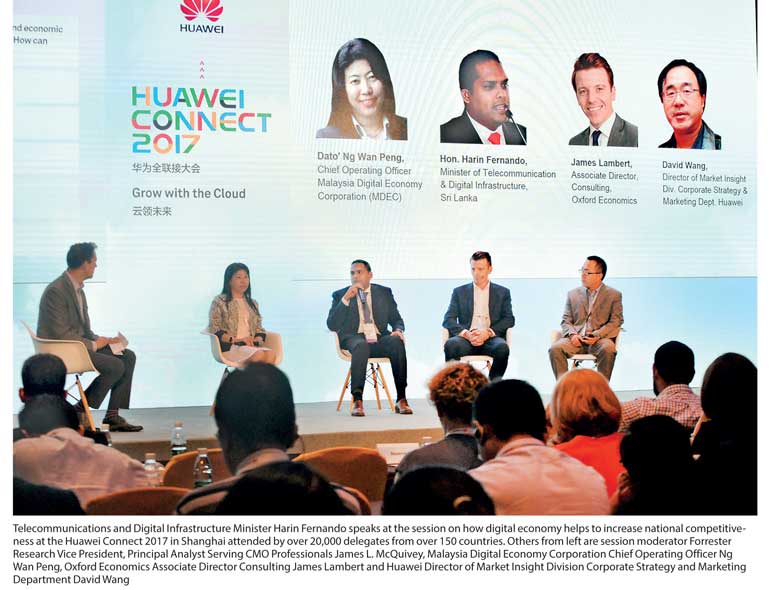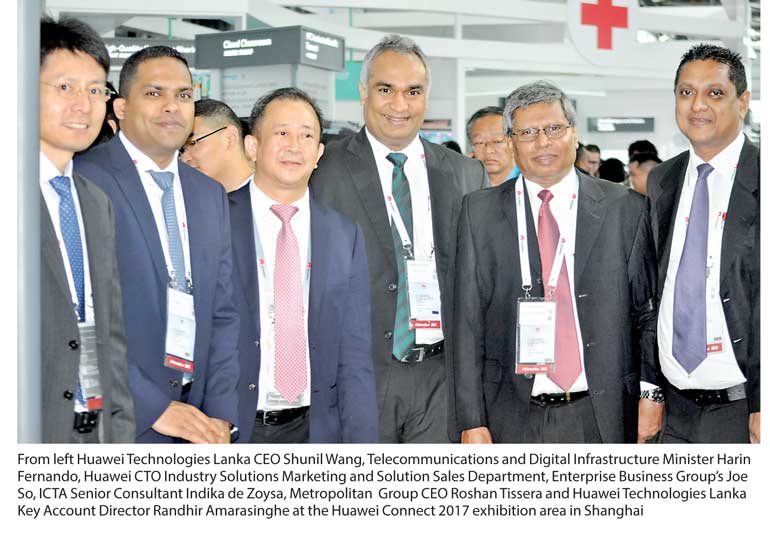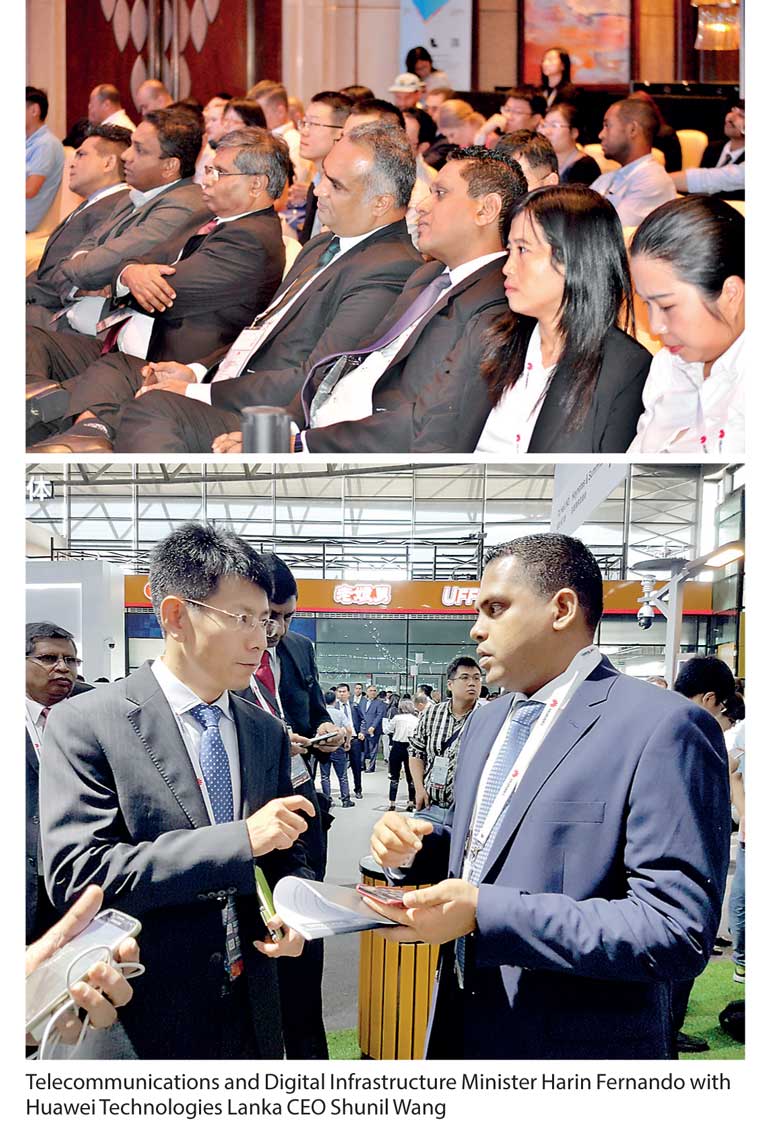Thursday Feb 26, 2026
Thursday Feb 26, 2026
Friday, 22 September 2017 00:00 - - {{hitsCtrl.values.hits}}



Telecommunication and Digital Infrastructure Minister Harin Fernando recently shared key insights to how digital economy helps to increase national competitiveness at the Huawei Connect 2017 in Shanghai.
Other members of the panel were Malaysia Digital Economy Corporation Chief Operating Officer Ng Wan Peng, Oxford Economics Associate Director Consulting James Lambert and Huawei Director of Market Insight Division Corporate Strategy and Marketing Department David Wang. The session was moderated by Forrester Research Vice President, Principal Analyst Serving CMO Professionals James L. McQuivey.
The session was a key event of Huawei Connect 2017 which drew around 20,000 participants over three days from over 150 countries including Sri Lanka.
The digital economy session looked at many key issues such as how digital technology innovation creates new opportunities for creating new business and economic models for creating value. It also focused on elements of national competitiveness the digital economy can influence the most faster and what are the most challenging tradeoffs nations have to make when decided where to put digital investments. The panellists also dealt with what kind of digital infrastructure does a country need in different phases of development and how can governments, enterprises and other ecosystem partners work together to make digital technology innovation work. Another facet was how can private sector and individual citizens make a difference in how a nation digitalise.
During the discussion both Minister Fernando and Malaysia’s Peng emphasised that digital technology platform is best when used as a sharing economy platform as well as to improve life of citizens, delivery of government services and private sector efficiency.
Fernando said digital technology is a social resolution and that social media is a classic example.
“Citizens are ahead in terms of digital technology and to serve them effectively and respond to efficiently especially in social media is a challenge for the Government. All stakeholders and users of technology need to be socially responsible,” he emphasised.
He and other panellists also pointed out that digital transformation is key to improving competitiveness at business level as well as enhancing efficiency of government and serving citizens better.
“Building digital infrastructure is key,” said Minister Fernando adding that in Sri Lanka this was well recognised by the current Government by establishing a Ministry dedicated to digital infrastructure.
Noting that digital transformation is a journey, Minister Fernando emphasised that all stakeholders need to be open minded and not vendor-locked. “It must be a Public Private Partnership,” he stressed.
“Sri Lanka is an emerging economy and digital transformation and connecting everyone faster is critical. If we are focusing on a sharing economy via digital platform or transformation then if consolidation of private sector networks will help for greater viability, efficiency and scalability then it must be pursued,” opined Minister Fernando.
The Forum also highlighted key findings of the joint study by Oxford Economics and Huawei on measuring the true economic impact of digital technology on nations.
The study speaks of “digital spillover” and says it is key to understanding how digital investments translate into economic performance. The three channels for the digital spillover are the internal digital spillover at company level, vertical digital spillover across industries and users and horizontal digital spillover whereby innovation b one company is emulated by others leading to productivity gains across a sector.
“Digital investments drive growth and the digital spillover is a core part of that,” said Oxford Economics person.”It is the role of government to incentivise digital investments and do as much as they can to multiply and amplify the channels for digital spillovers,” Oxford Economics Associate Director Consulting James Lambert emphasised.
The Oxford Economics and Huawei study identified six priorities for Government to maximise the digital spillovers. They are 1) Developing an active digital strategy; 2) providing digital infrastructure; 3) prioritising entrepreneurship and innovation, 4) encouraging a vibrant technology sector, 5) investing in new competitive resources, and 6) bridging the digital divides.
He said the optimal digital strategy will be tailor-made to each country’s strengths and constrains. “Governments must combine strategic oversight with direction action,” he added,
Governments must nurture an attractive business environment that incentivise entrepreneurship and reward innovation through wider technology adoption whilst a thriving local technology sector will play a crucial role in spurring innovation for which collaboration and openness are key.
The Government’s mandate in bridging the digital divide is that the State focuses on providing internet access to the “have-nots” and high speed connectivity to the “haves” while improving skills and awareness.
“If governments can get the digital spillover right, it could deliver a considerable boost for their GDP and collectively to the global GDP,” Lambert said. According to him the high digitalisation scenario could boost 2025 global GDP by $ 1.7 trillion, which is equivalent to $ 500 extra in the pocket of every working age adult in the world.
Huawei’s Wang said ITC technologies drive the continual progress of digitalisation as society enters the intelligent era of all things intelligent, all things connected and all things sensing. It was pointed out in the next 10 years such intelligence will help to upgrade and transform the supply side and provide new traction for higher economic growth. He said the “+ intelligence era” will drive the continual growth of digital economy up to 24% of global GDP by 2025 from 11-15% at present.”